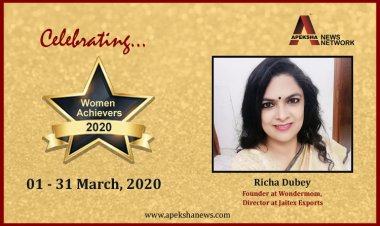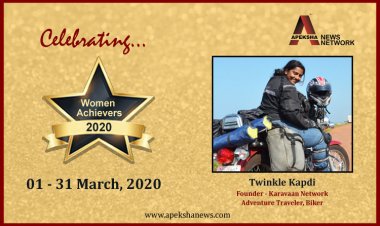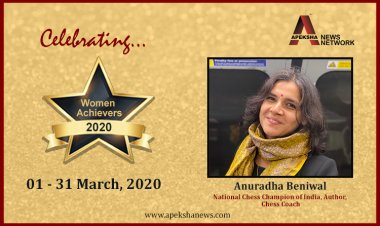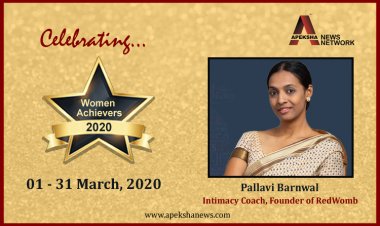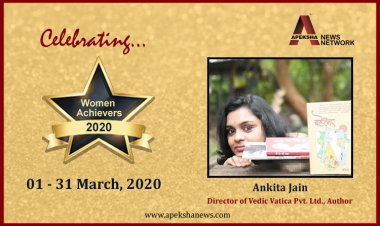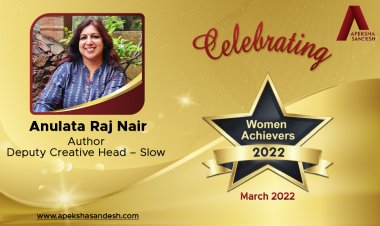“If you believe in your art, it will be recognised irrespective of gender, age and sexuality,” says ace photographer Monisha Ajgaonkar
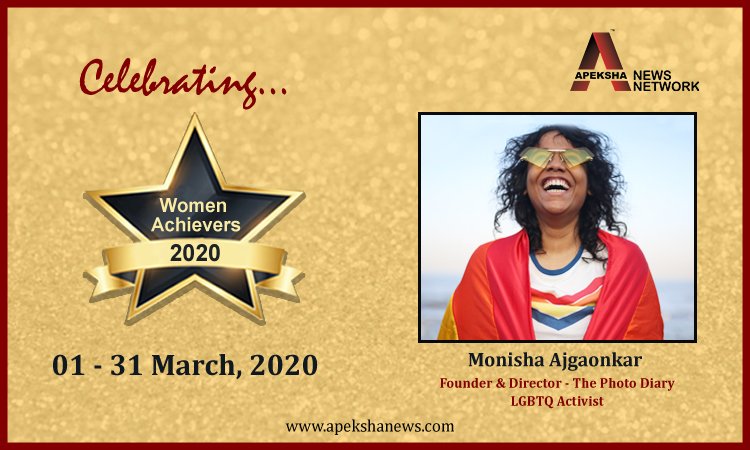
Mumbai based LGBTQ+ activist and entrepreneur, Monisha Ajgaonkar is known for her commercial and wedding photography. She is the founder of The Photo Diary and have been in the field of photography for the past 8 years. She has travelled through all genres of photography and explored it through her world. The company’s profile boasts quality photography across many streams—weddings, corporate functions, fashion portfolios and more. The Photo Diary’s portfolio contains over 500 weddings over the years.
Monisha was brave enough to come out of the closet, and put her lens to frame the beauty of relationships. She has been using her skills and talent to work on several projects that shed light on the challenges faced by the LGBTQ+ community in India. Apart from photography, Monisha has also made some short films that portray her fight for equality for the LGBTQ+.
Her project called ‘L for Love’ won an award at the 2018 DMA Asia ECHO Awards. Her recent collaboration was with Mumbai's very own Drag Queen, activist and artist Sushant Divgikr wherein together they created a stunning, yet coming of age photo-series called ‘Blossom’. She is also the mind behind various projects such as, ‘Love: No Boundaries’, ‘Unmasked’, ‘L: Love Matters’, to name a few.
Monisha was awarded two of the most prestigious awards namely, India’s Most Prominent Women Empowerment Awards at Delhi by Geeta Phogat and Sudha Chandran and IFA THAILAND 2019 (International Fame Awards) by Kangana Ranaut for Best Candid Photographer in Mumbai, held in Thailand.
Monisha is the recipient of the National Achiever Award as the Best Artist and LGBTQ Artist by Kriti Sanon in Delhi. She was recently also recognized as the International Young Icon of the year for Candid Photography.
At Apeksha News Network, we had a chance to talk to the ace photographer and LGBTQ activist Monisha Ajgaonkar about her journey so far, her distinguished work and her contribution towards the LGBTQ community. Check out the excerpts!
Tell us a little about yourself and The Photo Diary
My photography stint started back in 2008 when I started taking pictures with a Nokia 6600 in college and joined Sir JJ School of Arts, Mumbai. It was also a phase wherein I was trying to subscribe to the idea of having a career. I had no other path in mind other than that of a Photographer. Picture-taking had become an event in itself for me by then and I was subconsciously framing all the time. I found my way to freelancing for the Midday and Bombay Times. Slowly, I ventured into fashion photography, shot for Rolling Stone Magazine, and started my company, The Photo Diary in 2014.
The Photo Diary invented itself from a very humanistic and contemporary art of photography and cinematography. We believe in the art of reconnoitring human emotions and scripting it in the form of colourful and monochrome images. These become a source of joy in the present and nostalgia in the future.
Tell us a bit about your work for social justice and rights LGBTQ in India.
I did my best to convey messages about social justice and rights of LGBTQ through my art and photography. I curated a campaign series that was based on my personal experiences as my way of expression as people were uncomfortable to talk about it and didn’t appreciate confrontation. I tried to send out a positive message with each of the series to inspire others to come out and accept the reality.
You have been working on LGBTQ rights in India for a few years, how does Indian society view LGBTQ people? What is the status of LGBTQ people in Indian society?
India has taken its own time to accept the LGBTQ community, things were very different back then. After I realised about myself, I didn’t come out for two years. As soon as I started working, I also started to gain confidence along with good earnings and recognition. I started to like myself for who I was and there was a sense of pride in it.
It took everyone around a lot of time to accept the concept of being gay, it was alien to them. For the elder generation, it was a lot to digest and hard for them to understand. In fact, it has been 10 years since I have come out, and my family only started accepting me until last year.
Since the time the LGBTQ community acquired their rights and abolishing Section 377, awareness was spread to people through various kinds of media, accepting us has become much more easier even if people in India fail to understand it. Although it was slow, the struggle has been real, India has come a long way and we, the LGBTQ community have a long way to go!

With regards to the LGBTQ+ issues, what tends to the mainstream problems for the community? Also, what are some overlooked issues for the LGBTQ+ community in India?
On normal days apart from the bad ones, people made a very big deal about it. They treated me like I belonged to another world. For instance, a simple friendly and humble gesture from me would make them feel uncomfortable as they would read too much into it. My work was affected, clients would deny working with me, my appearance affected them and I did lose clients because I was gay. On the bad days one would face bullying, violence, discrimination, judgements on one’s personality only to make them feel unwanted, and even unemployment.
LGBTQ rights were definitely overlooked. We wouldn’t technically need the rights if everyone was treated equally, irrespective of the choices they made!
What have been effective activist strategies for the implementation of the equal rights of LGBTQ Indian citizens? How far they have been successful?
Encouraging activism and celebrating activists has helped to a great extent. Spreading awareness through NGOs that take care of the community, not just for people outside but even to those who are a part of it. It has helped the families of the people in the community, by solving problems of acceptance, and support. Social media created a lot of platforms and opened doors to various others that helped boost strength, talks and seminars not just awareness but problem solving. Various rallies throughout all these years have united us and created a bond that cannot be broken.
Regarding #MeToo, it has spawned other movements and raised awareness of abuse of people by those with power over them or simply in intimate relationships, or in purported ‘corrective’ forms of rape, and others. How can we develop more empathy for the marginal in society who come forward to have compassion, respect, and work towards implantation of justice in the legal system?
The #MeToo movement has been one of the strongest movements till date. It has helped people raise voice against injustice and share with others what they’ve been through, only to make them realise they are not alone. It has given courage to people to speak out loud, not be okay with behaving as if nothing happened, blaming themselves for being the victim
We need to be more open, cause we know we are not the only ones facing it. The more people read and hear about what others are going through the more courage it will give them to come out or support the people in need. Voicing for justice together will not be able to stop any system to overlook matters.

Being a proud of belonging to LGBTQ community cannot be one of the easiest decisions to stand. You have not just become a face for the LGBTQ community and their rights in the country but have been very vocal and public about it. Have you faced any kind of backlash because of that?
I was 19 when I realised I was gay. I thought it would be better to hide it in the initial first two years as I wasn’t sure of being able to survive as a lesbian. At that time I was also working with several media houses so I always preferred being cautious. I was just waiting to be confident and courageous enough to come out. I started to earn my own money, and decided to move out immediately so that I don’t have to be dependent on anyone. I just wanted to be alone as I needed my privacy to figure my future. All I wanted was the exposure of independence so that I could love myself and accept me for who I am. This would only help me to be myself and the only way others would be open to accepting me for me.
I lost a lot of work. I was very open about it when I came out and not afraid of people’s opinions. I was also well taken for what I was standing. But I was not very well accepted as lesbian wedding photographer. They didn’t want me to shoot the wedding as people were traditional and unaware. People questioned my funky way of dressing and expressing myself. So many times, I was booked for a certain kind of shoot because they thought it would look good with the vibe of the gig, and not my work. All these years of experience took me to understand what my personal genre is, what projects make me content and what was best to boost my creativity. So now I choose all of my work based on it.
Until sometime back photography was considered as a ‘Men’s thing', though the stereotype is gradually breaking. Being a woman, did you face any issues in this field? If yes, share few with us.
To be very lucky, I have never faced any issue in context to this. I always believed in the true form and meaning of art which doesn’t have anything to do with gender. I have learnt that - individuality and appreciation, along with confidence in your genre of working is the only thing that will make you unique and stand out. It will not let anyone take your place as one’s individual style cannot be mimicked. If you believe in your art, it will be recognised irrespective of gender, age and sexuality.
Having confidence in your art, performance and constantly challenging yourself is the key to being extraordinary!

You are also an artist, a photographer. Art plays a huge role towards the growth of the country, considering culture, youth, etc. What do you feel that what kind of art/literature/cinema India needs currently?
I can happily say that people are now aware and open about understanding offbeat art, literature and cinema. Personally I feel that the youth being open to the sense of reality has opened doors to such kinds of media platforms and vice versa. People have grown fond of anything that is real, has a true story, anything raw and risky, and lastly anything that helps them be vocal.
As an artist and also a part of an audience, the country now needs art, literature and cinema that portrays more empathy. People are understanding but they are not compassionate enough to give a helping hand. More problem solving than just being vocal about a problem, and encouragement to dare to be different.
What main change would you like to see for young girls in the next generation?
I would like the young women to keep their head high, heels longer and straddle their way to being stronger than ever. With the kind of exposure they have, it has its own pros and cons. If the confidence comes easy from a certain source, they must understand the weaker it is. An easy example would be social media. With too many options, they tend to get confused, so they need to focus more against distraction, take less pressure about planning the future and be okay about being confused so that they find clarity.
I studied psychology and ended up dropping out to be a photographer. It is very important for them to keep challenging and be open to experimenting. They must not forget their traditional roots and teachings, while they must inculcate the new age lessons to find a more creative solution.
If you could give one piece of advice to your younger self, what would that be?
If I could go back in time to give myself a piece to advice - it would be to love myself. I never loved myself and was my own enemy. I also dealt with weight issues, but most of the problem was only in my head, I would definitely ask her to enjoy food and not criticize it. Being grateful for what you have and what you are, even though it might not seem enough that time, but that is what is going to make you and God will give you in abundance.

What woman inspires you and why?
Many women from my work and field inspire me, including my clients. Portrait photographer Bhumika Bhatia, Riddhi Parekh who is specialist in street photography, shoot director and photographer Rema Maya, all of them inspire me with the work they do. I am the most excited to see their new projects. My friend Kayva D’souza, a blogger, also inspires me to a great extent.
My daily inspiration comes from very simple things for example my maid who makes food for me. I think to myself if I will ever be able to make the kind of food she makes.
Why do you think we should celebrate International Women’s?
Apart from highlighting the achievements of one another, this day is to celebrate one another for coming through all the hardships and difficulties, our birth inherent quality of multitasking and all the beautiful things women are capable of. Just one day isn’t enough so we must appreciate them and ourselves at every opportunity we get. On this day, we remind ourselves to support all the women we know and help each other grow.

Apeksha News Network congratulates Monisha Ajgaonkar for her being an epitome of inspiration to many women and wishes her good luck for her future endeavours!



